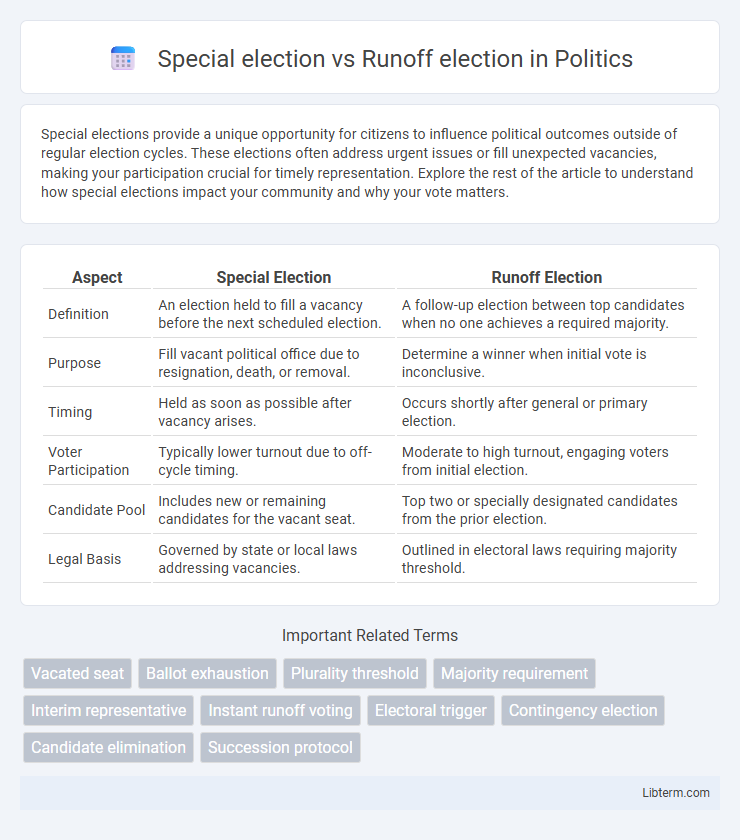Special elections provide a unique opportunity for citizens to influence political outcomes outside of regular election cycles. These elections often address urgent issues or fill unexpected vacancies, making your participation crucial for timely representation. Explore the rest of the article to understand how special elections impact your community and why your vote matters.
Table of Comparison
| Aspect | Special Election | Runoff Election |
|---|---|---|
| Definition | An election held to fill a vacancy before the next scheduled election. | A follow-up election between top candidates when no one achieves a required majority. |
| Purpose | Fill vacant political office due to resignation, death, or removal. | Determine a winner when initial vote is inconclusive. |
| Timing | Held as soon as possible after vacancy arises. | Occurs shortly after general or primary election. |
| Voter Participation | Typically lower turnout due to off-cycle timing. | Moderate to high turnout, engaging voters from initial election. |
| Candidate Pool | Includes new or remaining candidates for the vacant seat. | Top two or specially designated candidates from the prior election. |
| Legal Basis | Governed by state or local laws addressing vacancies. | Outlined in electoral laws requiring majority threshold. |
Understanding Special Elections
Special elections occur to fill political vacancies that arise unexpectedly, such as when an incumbent resigns, passes away, or is removed from office before their term ends. These elections are scheduled independently of the regular election cycle and can address various offices, including legislative and executive positions. Understanding special elections is essential for grasping how democratic systems maintain continuous representation and address unforeseen political changes.
Defining Runoff Elections
Runoff elections occur when no candidate achieves the required majority in the initial voting round, triggering a second election between the top contenders to determine the winner. These elections ensure that the elected official has majority support rather than just a plurality. Runoff elections are commonly used in nonpartisan or single-member district systems to increase electoral legitimacy and voter representation.
Key Differences Between Special and Runoff Elections
Special elections are held to fill vacancies in office before the next scheduled election, often triggered by resignation, death, or removal of an elected official. Runoff elections occur when no candidate achieves the required majority vote in the initial round, leading the top candidates to compete in a subsequent election to determine the winner. The primary difference lies in their purpose: special elections address unexpected vacancies, while runoff elections resolve inconclusive vote outcomes.
Purpose and Timing of Special Elections
Special elections are held to fill unexpected vacancies in public offices, such as when an elected official resigns, passes away, or is removed before their term ends, ensuring continuous representation. These elections occur at irregular intervals, scheduled as soon as possible to address the vacancy promptly. In contrast, runoff elections happen after a general election when no candidate secures the required majority, aiming to determine the winner among the top contenders.
When Are Runoff Elections Held?
Runoff elections are held when no candidate achieves the required majority vote in the initial election, typically exceeding 50%. They occur shortly after the general election to determine the final winner between the top candidates. This process ensures that the elected official has majority support, which is critical in jurisdictions requiring a clear mandate.
Legal Framework Governing Special Elections
Special elections are governed by specific legal frameworks that vary by jurisdiction, detailing conditions such as vacancy occurrence, timelines, and ballot procedures to ensure fair representation. Unlike runoff elections, which are designed to resolve inconclusive results from general elections through a subsequent vote, special election laws emphasize filling unexpected vacancies in legislative or executive offices promptly. Statutes and election codes provide structured guidelines for notification, candidate eligibility, and voting methods unique to special elections to uphold electoral integrity and continuity in governance.
Voter Participation in Special vs. Runoff Elections
Voter participation in special elections typically tends to be lower compared to runoff elections due to limited media coverage and reduced public awareness. Runoff elections generally see higher voter turnout because they occur shortly after a general election, maintain heightened political engagement, and involve more competitive races. Studies indicate that runoff elections can increase voter participation by up to 20% relative to special elections, reflecting the impact of election timing and voter mobilization efforts.
Common Scenarios Triggering Special Elections
Special elections are commonly triggered when an officeholder resigns, passes away, or is removed from office before their term ends, requiring voters to fill the vacancy promptly. Runoff elections occur when no candidate achieves the required majority in the initial election, necessitating a second round between the top contenders. Understanding these scenarios clarifies the distinct purposes and timing of special and runoff elections in maintaining legislative representation.
How Runoff Elections Impact Election Outcomes
Runoff elections impact election outcomes by ensuring that the winning candidate secures a majority vote, preventing victories based solely on a plurality. This process often changes campaign strategies as candidates must appeal to a broader electorate in the second round. Voter turnout in runoff elections tends to decrease, which can influence the final result by favoring candidates with a more motivated and organized supporter base.
Pros and Cons of Special and Runoff Elections
Special elections allow voters to fill vacancies quickly, ensuring continued representation, but they often suffer from low voter turnout and higher administrative costs. Runoff elections provide a decisive winner by requiring a majority vote, promoting legitimacy, yet they extend the election process and can lead to voter fatigue. Both election types aim to maintain democratic accuracy, balancing promptness and voter engagement challenges.
Special election Infographic

 libterm.com
libterm.com